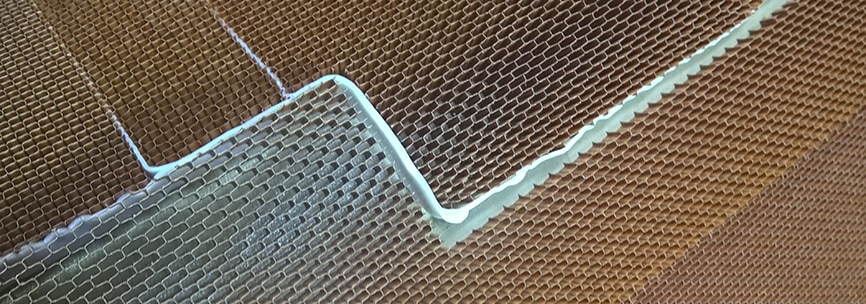A topic that I encounter again and again in my consulting work is the development of composite components and their subsequent production in series. Already during development, the course is set for possible problems in production, which then result in expensive reworking or rejects.
An example is shown in the picture above: In this component, the cuttings of the core material (Nomex) were taken over 1:1 from CAD and not optimized for production. Result: The cuttings did not fit correctly and there was a high level of scrap and rework in production. Deviations between the 3D model and production, which were not considered in the planning, had to be paid for at a high price.
Cost reduction begins with planning
Suppose a company wants to use composites in components or assemblies. However, the designers have little or no experience with the respective material and, above all, with the production of the components and the various manufacturing processes.
Most of the time, the process then takes the form of designing a corresponding 3D model on CAD and the purchasing department looking for a supplier. As a rule, this supplier should be inexpensive. However, it would have been much more decisive to take advantage of opportunities to reduce the price of the component during the design phase. An opportunity that is often not taken.
External consulting pays off
Here’s where my advice comes in. An important question here is: Was the specifications drawn up before the start of the construction? Because depending on the requirements of the component, the following points should be answered, for example:
- Which side should be smooth (tool side)? Both?
- Expected number of pieces ?
- Mechanical and technical properties ?
- resistance?
- Monolithic or with core material ?
Of course, depending on the specific project, there are usually many more questions. If the requirements for the component are defined in the specification sheet, I can support the design. For example, the preferred manufacturing process can vary depending on the requirements.
An almost identical part can be manufactured using prepreg press technology as well as prepreg autoclave technology. However, different parameters must be taken into account in the design process in order to achieve an optimum result. It is therefore essential to define the requirements in the specifications beforehand.
The design has a direct impact on the ideal manufacturing process, manufacturing costs, tooling costs, cycle time, rework costs and possible scrap rates. Although the actual material costs of the two parts are almost identical. This is why it is so important to determine the desired production process before the design and to consider the relevant details.
Better safe than sorry
Based on my hands-on experience, I know how the supplier defines, implements and manufactures the part in the subsequent specification sheet. Possible examples of support can be:
- Which radius makes sense at which edge?
- Which steps and paragraphs, if necessary, are where and as possible?
- How many parts should the tool consist of for optimum demoulding?
- What material should the tool be made of?
- Which transitions and attachment points ?
- What type and extent of finishing ?
- Type of equipment ?
- Precisely fitting development of fabric cuts and core material
- Creation of Plybooks
- support for prototype construction and testing
- support for mould design
- Selection and auditing of the supplier
- Setting up and setting up production
- Training of employees in production
- Process optimization and stabilization
- Project management
What challenge do you have for me?
Unfortunately, very often I am only called when there are already problems in production. The right planning pays off many times over when developing carbon composite components. So let us talk about your composite project or your ideas in time. You can reach me at +49 7161 988-4470 or at info@linge-composite.de
